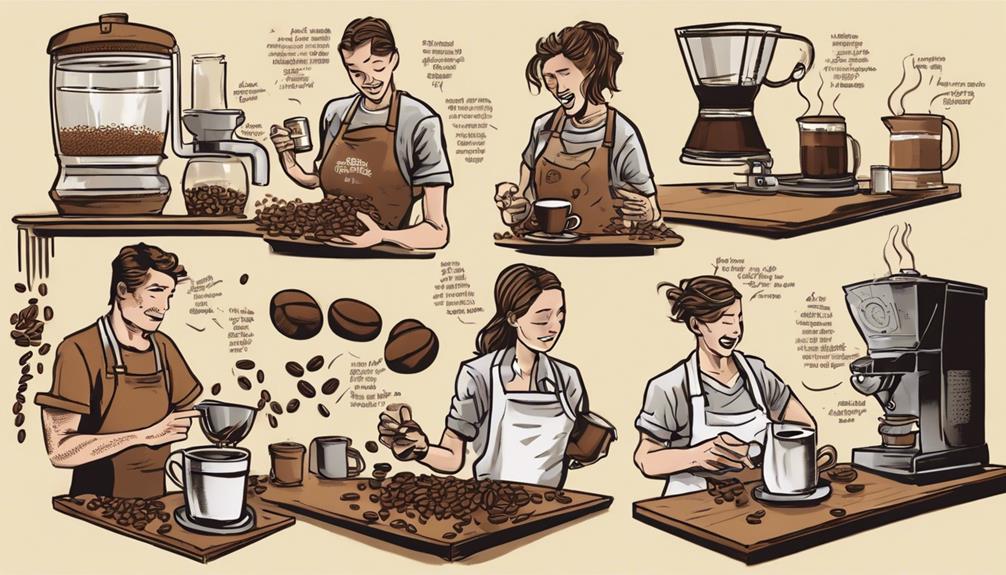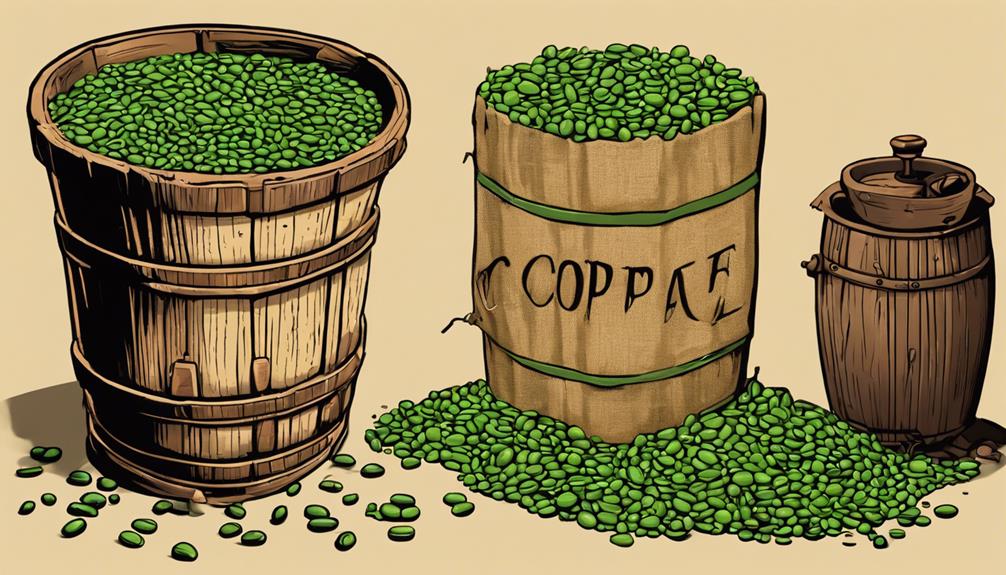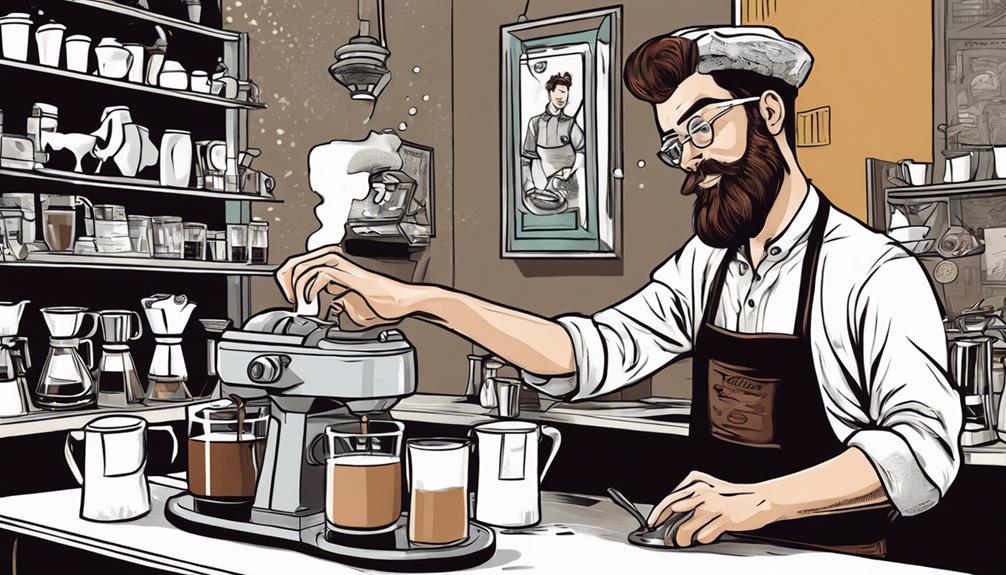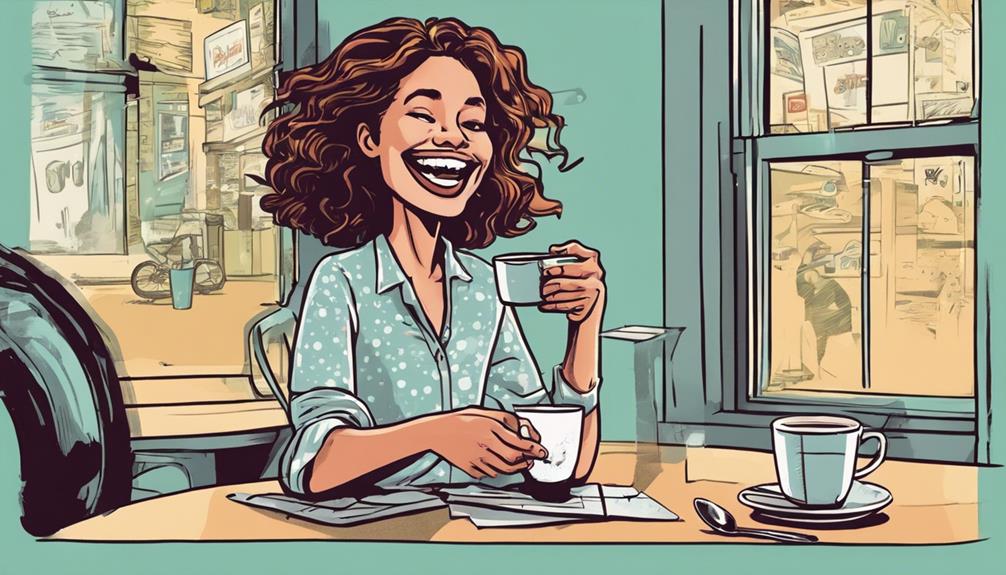To be considered a coffee expert, you need to delve into the world of coffee. Experiment with different types of beans, learn about various roasting techniques, experiment with a range of brewing methods, and always be on the lookout for unique flavors. Immerse yourself in local coffee shops, participate in cupping sessions, and fully embrace the specialty coffee scene. By familiarizing yourself with bean varieties, roasting methods, and brewing techniques, you’ll refine your palate and gain a deeper appreciation for the complexities of coffee. Constantly seeking out new experiences and continuing to explore will help you enhance your expertise. Every sip presents an opportunity to grow your passion for coffee. Let your journey in the world of coffee elevate your senses to a whole new level of appreciation.
Key Takeaways
- Explore various bean types and processing methods for depth of knowledge.
- Master different roast levels to understand flavor nuances.
- Experiment with diverse brewing methods for unique taste experiences.
- Attend cuppings and visit local coffee shops to refine palate.
- Immerse in specialty coffee culture to broaden expertise.
Understanding Coffee Connoisseurship
To become a coffee expert, you must grasp the essence of coffee connoisseurship. Coffee connoisseurs explore the world of different types of beans, brewing methods, and flavor profiles to enhance their understanding and appreciation of coffee. They continuously seek out new and unique coffee experiences, and are eager to learn about the history and culture behind each cup. In addition to understanding the different aspects of coffee connoisseurship, it is also important for coffee experts to familiarize themselves with coffee importation tips in order to truly understand the journey of the coffee bean from its origin to their cup. This complete understanding helps them to fully appreciate and respect the art of coffee.
Understanding the subtleties of various beans such as Arabica, Robusta, and specialty single-origin beans is crucial. Each kind offers distinct flavor notes and characteristics that contribute to the varied taste experiences coffee can provide.
Investigating brewing techniques like Pour Over, French Press, and Espresso allows coffee connoisseurs to experiment with different extraction processes, leading to a deeper comprehension of how brewing methods impact the final cup.
Moreover, being able to identify and appreciate various flavor profiles, whether fruity, nutty, chocolatey, or floral, is indispensable for a coffee connoisseur to cultivate a refined palate. Embracing the art of coffee connoisseurship involves continually seeking new flavors, brewing methods, and experiences to broaden your expertise and refine your coffee knowledge.
Exploring Coffee Beans
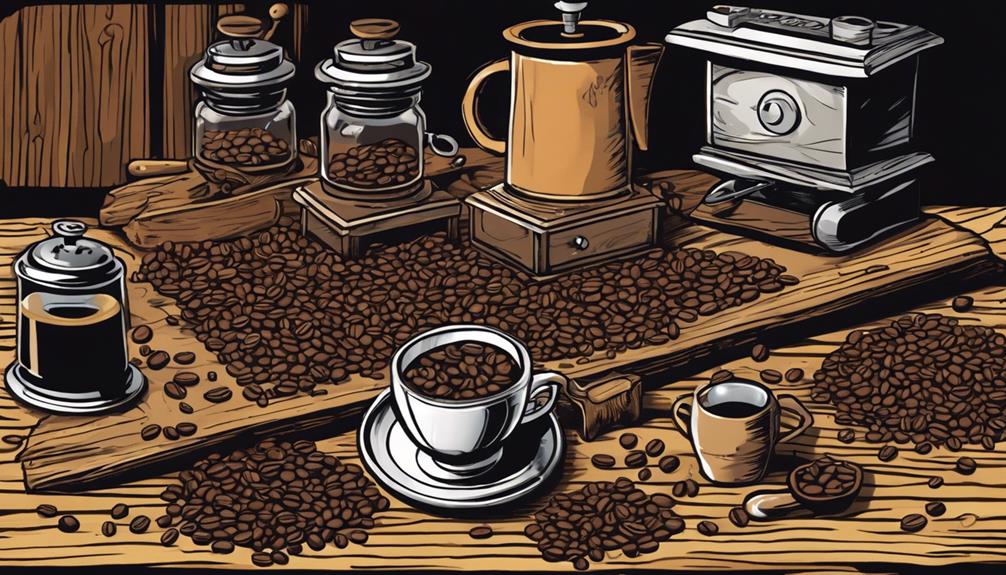
When it comes to exploring coffee beans, you'll discover that there are various types like Arabica, Robusta, Liberica, and Excelsa, each offering unique flavors.
Understanding the different processing methods, such as washed or natural, can greatly impact the taste of your coffee.
Bean Types Overview
Exploring coffee beans introduces you to a rich variety of flavors and characteristics that define different bean types. Arabica, known for its smooth and flavorful profile, is often considered a higher quality coffee compared to the more robust Robusta beans.
Liberica and Excelsa, though less common, offer unique and complex flavors that can intrigue even the most discerning coffee connoisseur. Understanding the distinctions among these different types of coffee beans is essential for appreciating the diverse range of flavors that coffee has to offer.
Whether you prefer the fruity notes of a washed Arabica or the boldness of a natural Robusta, each bean type contributes its own nuances to the final brew. Single-origin coffees, sourced from specific regions, further highlight the individual characteristics of different bean types, allowing you to explore further into the world of quality coffee.
Processing Methods Explained
Different processing methods play an essential role in shaping the flavors and characteristics of coffee beans. Coffee beans can undergo various processing methods such as washed, natural, honey, or pulped natural.
Washed processing involves removing the cherry's outer skin before drying the beans, resulting in a cleaner taste. On the other hand, natural processing includes drying the whole cherry, which imparts fruity and fermented flavors to the beans.
Honey processing removes the skin but leaves some mucilage, creating sweet and complex coffees. Exploring these different processing methods can lead to discovering diverse flavor profiles in coffee beans.
Single-Origin Benefits
By delving into single-origin coffees, you can truly savor the distinct flavor profiles shaped by the specific regions' soil, climate, and altitude. Single-origin coffees offer a unique opportunity to taste the individual characteristics of various coffee-growing regions worldwide. These beans showcase the terroir of their origin, providing an authentic and transparent coffee experience that reveals the essence of a particular region. Exploring single-origin coffees not only allows you to appreciate the diverse flavors and complexities present in coffee but also helps in developing a deeper understanding of the nuances found in different coffee-growing areas.
| Benefits of Single-Origin Coffees |
|---|
| 1. Distinct flavor profiles based on specific regions |
| 2. Showcases the terroir of where the beans were grown |
| 3. Offers an authentic and transparent coffee experience |
| 4. Develops appreciation for diverse flavors and complexities |
Mastering Coffee Roasts

How do the varying coffee roasts influence the flavors and aromas in your cup of coffee? Understanding the different roasts is essential in becoming a true coffee connoisseur.
Here's how different roasts can enhance your coffee tasting experience:
- Light Roasts: Light roasts are known for their higher acidity levels, which allow the unique characteristics of the coffee beans' origin to shine through. They offer a bright and lively flavor profile that showcases the bean's natural nuances.
- Medium Roasts: Medium roasts strike a balance between acidity and richness. They maintain some of the bean's origin flavors while also introducing a bit of caramelization, resulting in a well-rounded cup with moderate acidity and body.
- Dark Roasts: Dark roasts are bold and intense, with a smoky and sometimes bitter taste. These roasts bring out deeper, roasted flavors in the beans, offering a robust and full-bodied coffee experience.
Diverse Coffee Drinks and Brewing Methods
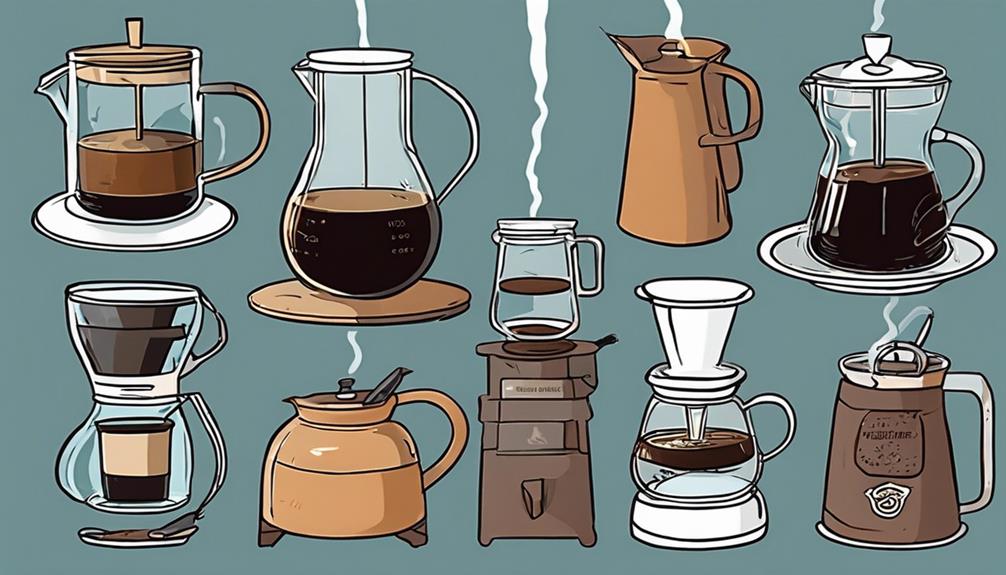
Exploring various coffee drinks and brewing methods allows you to uncover a multitude of unique flavor profiles and textures. As a coffee lover on your coffee journey, trying different brewing methods such as Pour Over, French Press, and Espresso can greatly enhance your experience.
Each method offers distinct characteristics that can highlight the best coffee qualities of the beans you use. To brew the best coffee, understanding factors like grind size, water temperature, and extraction yield is essential.
In addition, experimenting with alternative brewing devices like Aeropress or Chemex can reveal new nuances in coffee flavor that you may not have experienced before. By mastering these brewing techniques, you can extract the full spectrum of flavors from different types of coffee beans, making your coffee expertise even more profound.
Enjoy the process of discovering how each brewing method shapes the taste of your favorite beverage!
Enhancing Coffee Expertise
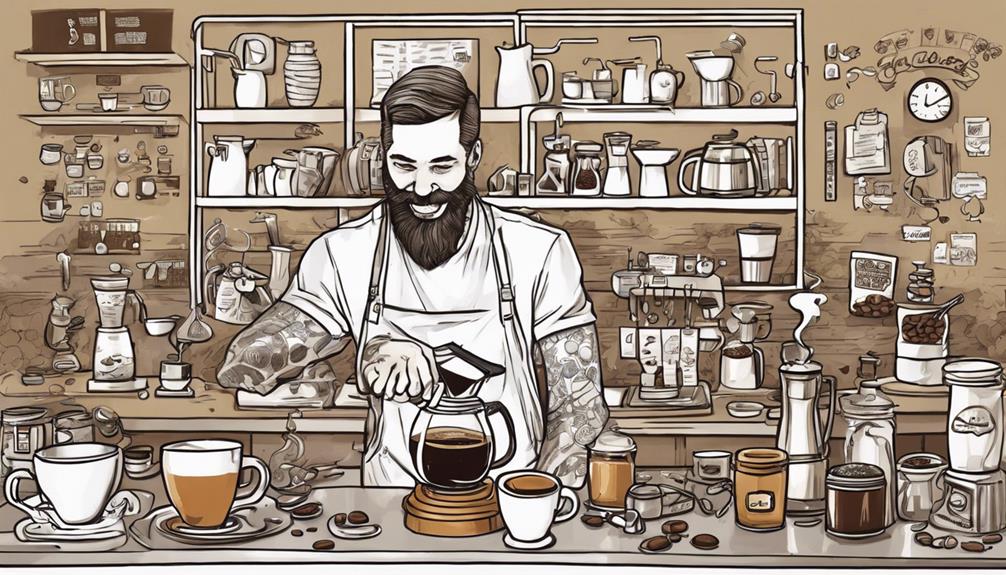
To enhance your coffee expertise, immerse yourself in the vibrant culture of specialty coffee.
Visit Local Coffee Shops: Explore different coffee shops in your area to taste a variety of specialty coffees. Engaging with baristas and trying new brewing methods will broaden your understanding of the coffee world.
Attend Cuppings: Participate in cupping sessions to refine your palate and discern various flavor profiles in specialty coffee. These events are great for honing your tasting skills and learning about different coffee origins.
Explore Coffee Varieties: Experiment with different coffee varieties from various regions around the world. Understanding the unique characteristics of each bean will deepen your appreciation for the complexities of specialty coffee.
Coffee Sommelier and How to Become One
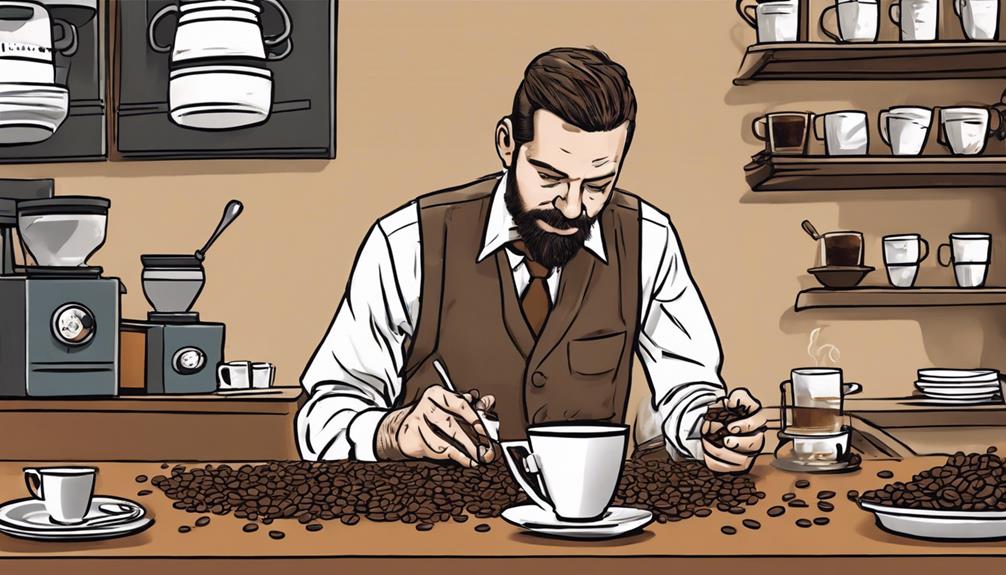
Becoming a coffee sommelier requires mastering the art of tasting, identifying, and evaluating coffee beans to assess quality and flavor profiles.
As a coffee expert, your role will involve teaching brewing techniques, guiding others to explore diverse blends, and enhancing their understanding of flavor nuances.
To start on this journey, you must acquire knowledge about various coffee varieties, brewing methods, and flavor profiles, alongside training in sensory evaluation and obtaining certification.
Frequently Asked Questions
How Can I Become a Coffee Expert?
To become a coffee expert, explore different beans like Arabica and Robusta. Immerse yourself in brewing techniques such as pour over and espresso. Attend events, workshops, and cuppings. Practice describing flavors like acidity and body. Engage with the coffee community for a well-rounded education.
How Do You Become a Coffee Sommelier?
To become a coffee sommelier, immerse yourself in coffee varieties, brewing techniques, and flavor profiles. Pursue certification courses focusing on tasting, evaluating, and teaching about coffee. Build expertise to work in specialty shops, consult for brands, or host tasting events.
What Is a Coffee Connoisseur Called?
A coffee enthusiast is often called a coffee sommelier, showcasing expertise in tasting and evaluating coffee. They can identify different coffee beans by sight, smell, and taste, playing an important role in evaluating coffee quality.
What Is a Coffee Lover Called?
A coffee lover is called a coffee enthusiast or connoisseur. You enjoy exploring various coffee varieties, brewing methods, and flavors. Your dedication to expanding your coffee knowledge drives you to seek unique experiences and appreciate the art of coffee.
Conclusion
Now that you've explored the world of coffee connoisseurship, your taste buds are primed to savor every sip like a seasoned sommelier.
Just like a painter with a palette of flavors, you can now appreciate the nuances and complexities in every cup of coffee.
So next time you take a sip, remember – you're not just drinking coffee, you're experiencing a masterpiece in a mug.
Cheers to becoming a coffee expert!
